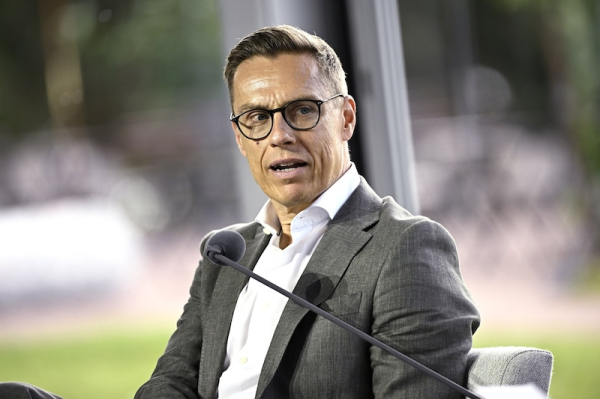
President of the Republic of Finland Alexander Stubb speaks at the Kultaranta Talks in Naantali on 17 June 2025. This year’s theme is the changing world order. Photo:
- Previous Article Nato maritime drone surprises sailor off Finnish coast
- Next Article Most Helsinki residents feel safe, survey finds
President Alexander Stubb said the next 24 to 48 hours would clarify the United States’ intentions in the conflict between Israel and Iran. Speaking in Naantali during the Kultaranta Talks, he noted that the form and scale of any US involvement remained uncertain.
“How the United States engages with this conflict will decide much. If and how it does, the next 24 to 48 hours will tell us,” Stubb said.
Jussi Halla-aho, Speaker of the Finnish Parliament, agreed that a US response was imminent but difficult to predict.
Both spoke at the annual foreign and security policy event held at the presidential summer residence. Their panel discussion was titled “Values or realism”.
The talks followed media reports that US President Donald Trump had left the G7 summit in Canada early and called for a National Security Council meeting at the White House. Simultaneously, Israel and Iran continued to launch missile strikes at each other.
Stubb and Halla-aho said they believed Israel sought to alter the regional balance of power and replace Iran’s government. They suggested that Israel wanted to draw the United States into the conflict due to limits in its own military capacity.
“The greatest risk of escalation lies in Israel’s awareness that it cannot topple the Iranian regime alone,” said Halla-aho. “It will try everything to involve its long-time ally, the United States.”
He added that previous US administrations might have reacted more cautiously to such efforts. “Trump’s administration is somewhat unpredictable,” he said.
Both leaders rejected the idea that democracy could be imposed by force in the Middle East. Halla-aho warned against repeating past interventions.
“I hope there is a careful review of precedents where military force was used to try and change regimes in authoritarian countries,” he said. “It did not work in Afghanistan or Iraq, and I believe the chances of success in Iran are no better.”
The conversation turned to Europe’s response to evolving security concerns. Many countries have increased defence budgets. Stubb said Finland’s military spending was not about preparing for peace but about deterring conflict.
“Our greatest security threat has always been and will always be Russia,” he said.
Stubb expressed frustration with the focus on defence spending as a percentage of GDP. “Wars are fought with capability, not percentages,” he said.
The two agreed on most issues of global politics until the topic of European support for Ukraine emerged. Stubb said Europe had given financial support “to the best of its ability”. Halla-aho disagreed.
He argued that the threat from Russia and Ukraine’s role in defending Europe were not reflected in all countries’ contributions.
“Europe’s greater responsibility for its region, including support for Ukraine, will be a permanent condition,” he said.
HT
- Previous Article Nato maritime drone surprises sailor off Finnish coast
- Next Article Most Helsinki residents feel safe, survey finds
Source: www.helsinkitimes.fi
